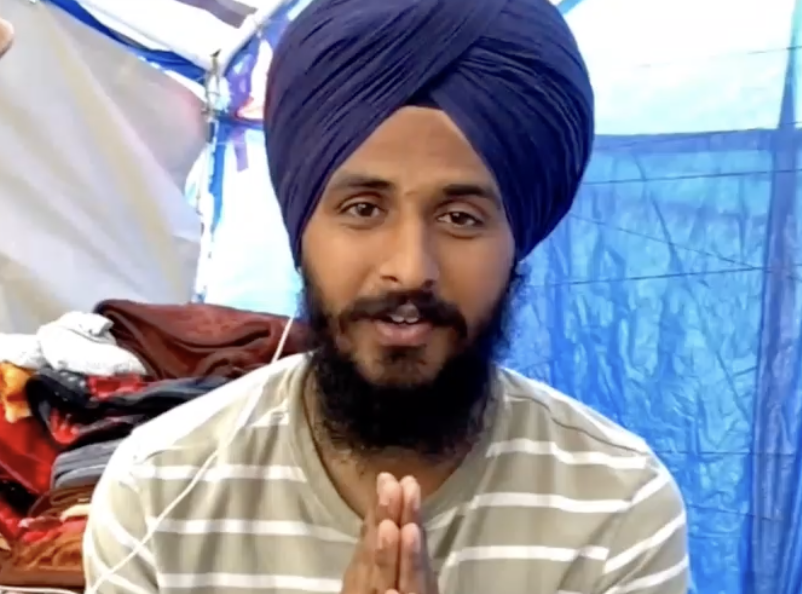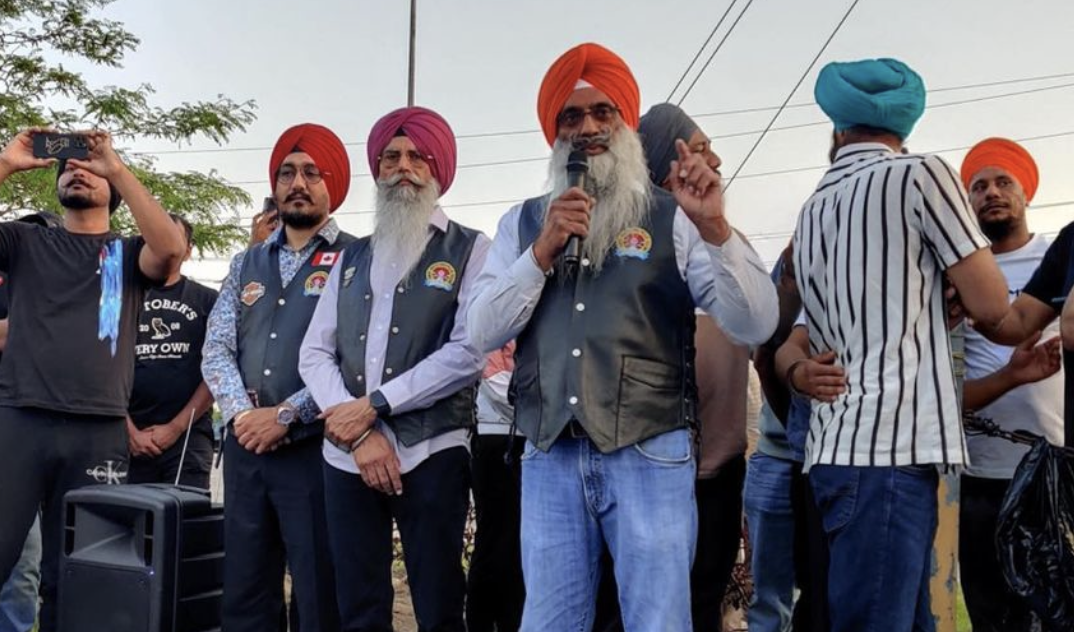These Students Were Due to be Deported But They Took on the Canadian Government and Won
June 16, 2023BRAMPTON, Ontario – For 18 days, hundreds of international students from India and their supporters camped outside Canada’s detention center for undocumented immigrants, weathering toxic smoke from wildfires and torrential downpours, all to fight deportation letters they received after they say they fell victim to an immigration scam back home.
This week, they’ve reached a “tremendous victory,” organizers say.
After escalating pressures from the sit-in right outside Canada Border Services Agency in Brampton, Ontario, the Canadian immigration minister announced Wednesday that all deportations related to the scam would be postponed until further investigation. This comes as some students were supposed to be deported this very week.
“Many of these international students sincerely came to Canada to pursue their studies at some of our world-class institutions and were duped by bad actors who claimed to be helping them in their immigration application process,” Immigration Minister Sean Fraser said. He assured that all deportations would be postponed until each were properly investigated.
“We are so proud,” Lovepreet Singh, a student who was supposed to be deported Tuesday told VICE News. “It feels amazing, but the battle is not over,”
“None of these things would have happened if these students hadn’t decided to come together and fight.” Arin Goswami, an organizer with Naujawan Support Network, a grassroots organization protecting migrant workers, said. “The students who are at the most marginalized of all of these groups–they're the ones here who are sleeping here every night, and they're the ones here who are showing us that more than anything else with courage, you can actually get the results.”
This was unthinkable a month ago, sit-in organizers with Stand for Student say, especially in a David and Goliath battle that saw undocumented students fighting Justin Trudeau’s government, which despite granting visas and permits at every point in the students’ journey, seemed to have turned a blind eye when they fell through the cracks.
Imagine this: you’ve paid tens of thousands of dollars for an immigration consultant back home–a requirement for many international students from India. You then receive an acceptance letter from a Canadian university and a government-issued student visa.
Upon arrival, you pay seven times the tuition compared to citizen students, graduate, receive a work permit and in some cases–even receive permanent residency. Then, suddenly you receive a letter, saying you’ll be sent home despite spending years paying taxes and contributing to the workforce in Canada.
“We are the victims,” Singh said. “These precious years that we have given to this country. We have invested so much.”
Singh’s family, like many others, have saved money for generations to send their son to Canada, a country that is widely seen as a haven and economic boon for immigrants. In fact, Singh is just one of hundreds of thousands of international students who come to Canada every year, contributing huge amounts to the nation's GDP.
For scale, in 2018, international students contributed about $21.6 billion to Canada’s economy, supporting almost 170,000 jobs for the middle class, according to stats collected by the Canadian government. In comparison, Canada’s military budget was $22.7 billion that same year.
Dozens of students told VICE News that they had to pay tens of thousands of dollars to the immigration consultant in India, who was responsible for vouching for them and going through the complicated process of applying for a student visa.

It’s because of these documents–approved by the Canadian government–that Singh and others say they didn’t feel the need to question their legitimacy. But with that sudden deportation letter and a new round of lawyer fees all due to fake admission letters written by the consultant in India that Canadian universities accepted, they realized how disposable they were.
“My parents have health issues. I couldn't even tell them that this was happening to me,” Raman Brar, another international student facing deportation, told VICE News. “They think that we're culprits. But if they think that, why aren’t they blaming the immigration process? They issued the visa.”
This isn’t the first time this has happened to the community. In fact, a 2022 investigation by the CBC’s Fifth Estate found that these scams by recruitment agents in India were common as thousands of students were lured to Canada only to find out that what they paid for, and what they were promised, isn’t what awaits them.

Critics of this system say that while this particular fight focusses around a certain scam agent in India, it’s not different from the way Canada exploits migrant workers from Mexico, and other parts of the world, giving them temporary work permits but then falling way short of offering any type of permanent residency or status.
“What this is creating is a permanent underclass of workers who don't have the same rights as everybody else. And that's bad for the entire floor of the working class,” Sarom Rho, an organizer with Migrant Workers Alliance for Change, told VICE News. “The call for permanent resident status, for all the calls for regularization without exclusion is a call to see that as a call for justice and to work for racial justice fight.”
Everyday at the sit-in, or morcha, an Indian term meaning a demonstration against the government, pick-up trucks unloaded boxes of pizza and temple food onto makeshift tables. Another truck swung by, dropping off kettles of chai, while another deliverd mattresses for the students to sit and sleep on.
During the 18 days, the students and organizers say they didn’t shell out a single dollar for food, water, or shelter. Instead, local business leaders, restaurant owners, lawyers, and supporters, mostly from the Sikh community in Toronto, made frequent trips out to the camp. “We were once international students too,” one business leader said, speaking to students inside one of their many tents. “We’re in this fight with you.”
Another challenge is Canada’s extreme and fluctuating weather. During the last two weeks, not only were students faced with severe torrential downpour which led to flooding in the tents, but also toxic smoke pluming from Quebec wildfires that saw Toronto and New York City become two of the most polluted cities in the world for several days.
“I never imagined that I would do anything like this,” Singh said, explaining that he didn’t have much experience with political sit-ins, much less becoming the face of a movement as the first student who received a deportation date. “It’s really hard to stay here, but to be honest, I’m here because of Gurbani,” meaning the “Word of the Guru” which is all about the trust and faith in a higher spirit to find the way.
Singh told us that many students who joined the camp came as a last resort, as they were having suicidal thoughts after they received the deportation letters. Many others underwent depression as they tried to hide it from their parents back home due to an overwhelming amount of guilt and embarrassment.
“If you heard every individual’s story, you would cry,” Singh said. “But we have to stay strong, we all have to work as a team.”
While some were initially unsure if the sit-in would work, the camp saw more and more supporters every night. Some evenings, when hundreds of people turned out, the protest even made it right up to the doors of the CBSA detainment office, reminding officials that they had no plans to leave until they won.
A week into the sit-in, Trudeau’s political rivals, including left-leaning New Democrat Party Leader Leader Jagmeet Singh and Conservative Party Leader Pierre Polievere also took notice and visited the makeshift camp, speaking in support of their fight for status.
While sit-ins have happened in Canada, they aren’t a common form of protests. But the morcha is a culturally significant part of Sikh culture, organizers say, going back to the modern historical days of the Indian independence movement against the British and recently in the 2020-2021 India Farmers Protest that saw 250 million protesters fight government policy for 333 days straight.
“We chose this kind of protest to be a central point for awareness and for the people to find us, learn about us, and support us,” Bikram Kullewalia, an organizer with Naujawan Support Network said. He also happens to be the son of a revolutionary leader who was instrumental in the Indian Farmers Protest.
“Just like back home, farmers doesn’t mean just one farmer. It’s a big percent of the population. It has to be about the people,” he added.
With this latest stay on all deportations, the students and organizers are clearing out their sit-in. But the fight is far from over, they say. In fact, they have no issue returning to set up their camp if they face threats again.
“The deportations have only been postponed temporarily. The government could try to deport some of the students after the investigations are complete,” Naujuwan Support Network said in an Instagram post. “If that happens, the student and the community have vowed to restart this morcha and maintain it until the deportations are permanently canceled.”

In Canada, a stay or reversal of deportation remains quite rare. Often, many of these immigrants and international students don’t have enough money, after paying so much upon their arrival, to then hire immigration lawyers and go through strenuous court battles. Many of these victims are also struggling to survive in Canada as living costs hit an all time high in the nation, and are forced to work multiple jobs.
“It shows us that the provisions that the working class needs are always available but the minister and Canada just chooses not to use them,” Goswami says. “But we’re forcing people to take action, because the government doesn’t have our interests at heart.”
While Singh never saw himself leading a movement, he’s now not committed to just permanently ending his deportation, but to also fight other issues within Canada’s immigration system, including the stripping of overseas degrees from qualified international students.
“This is amazing. Every single person, every community came together,” he said. “We put our differences at another table to solve this issue, and we won’t leave until we win.”
